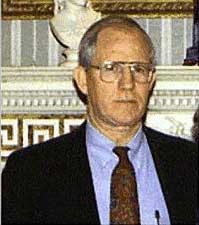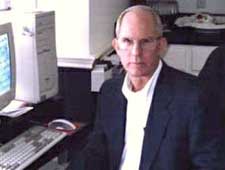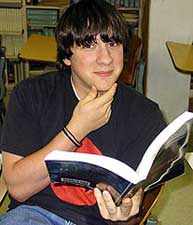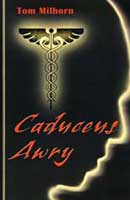Major Works
Novels
- Caduceus Awry (Writer’s Showcase, 2000)
Non-fiction
- The History of Physics (2008)
- Cybercrime: How to Avoid Becoming a Victim (2007)
- Writing Genre Fiction: A Guide to the Craft (2006)
- Electrocardiography for the Family Physician: The Essentials (2005)
- Crime: Computer Viruses to Twin Towers (2004)
- The Application of Control Theory to Physiological Systems (Saunders, 1966)
- Fluid and Electrolyte Balance (American Academy of Family Physicians, 1982)
- Chemical Dependence: Diagnosis, Treatment, and Prevention (Springer-Verlag, 1990)
- Drug and Alcohol Abuse: The Authoritative Guide for Parents, Teachers and Counselors (Plenum, 1994)
Biography of Tom Milhorn
by Nathan Kiser (SHS)
H. Thomas Milhorn Jr. was born on October 30, 1936, to Howard Thomas and Fay Milhorn in Kingsport, Tennessee. Milhorn graduated from Lincoln Memorial University in 1960 with a Bachelor’s of Science. He also attended the University of Mississippi in 1964 where he earned his Ph. D. In 1975 he obtained his Medical Degree. He married Katrina Harris, a nurse, on September 14, 1960, and together they have a son named Toby.
Thomas Milhorn is a member of the American Medical Association, American Academy of Family Physicians, American Society of Addiction Medicine, Mississippi Academy of Family Physicians, and the Lauderdale County Medical Society. Before becoming a medical doctor, he worked as a mechanical drafter from 1956 to 1957 at a vessel manufacturing company in California. In 1958 to 1991 he had numerous jobs in engineering, drafting, and medicine, having earned his MD in 1975. In 1992, retiring from the faculty of the University of Mississippi School of Medicine as associate professor of psychiatry and human behavior and professor of family medicine, he was in private practice for four years until he practiced Addiction and General Medicine at East Mississippi State Hospital for five years. Now he is permanently retired and enjoys writing, especially fiction, and other hobbies.
Milhorn’s non-fiction writings include The Application of Control Theory to Physiological Systems in 1966, Fluid and Electrolyte Balance in 1982, Chemical Dependence: Diagnosis, Treatment, and Prevention in 1990, and Drug and Alcohol Abuse: The Authoritative Guide for Parents, Teachers, and Counselors in 1994. All of his writings have been translated into Japanese. His first novel, Cadeucus Awry, was a finalist in the novel competition of the Eudora Welty Film and Fiction Festival, held annually in Jackson, Mississippi.
Milhorn is now working on another novel entitled Schizo, which takes place in a mental hospital.
Reviews
A Review of Caduceus Awry
by Nathan Kiser (SHS)
Caduceus Awry is an enthralling novel by Tom Milhorn. The novel grabs the reader’s attention and does not let go until every problem, of which there are many, is solved. The story is about a plastic surgeon, Dr. Mark Valentine, who loses his license due to alcoholism and is forced to work as a second-rate emergency room doctor on a limited institutional license. Valentine is accosted by a mob ring-leader and must stop a serial killer at his hospital to save the life of the only man who can get his license back. Throughout all of these problems, Valentine faces struggles in his love life and his fight against alcoholism.
I thoroughly enjoyed the novel because the plot had so many twists that it kept me guessing until the conclusion. Also, I appreciated Milhorn’s ability to be concise in the writing of the novel. Moreover, I was amazed that I could imagine myself in Dr. Valentine’s shoes as the novel progressed.
The plot follows Valentine from Atlanta, Georgia, through much traveling, to New Orleans, Louisiana, where he and the novel eventually stop. Milhorn has the ability to make these settings come alive to the reader. Also, the amount of travel keeps the reader guessing as to where Valentine will end up in the next chapter.
I would recommend the novel Caduceus Awry as an amazing medical mystery in which to immerse yourself. There are a few references to sex and alcohol, which may make the novel more suitable for mature young adults or adults. In addition, there are some occurrences of violence. However, I do not believe that these situations subtract from the novel or make it any less desirable to read.
Caduceus Awry is a novel of plot twists and flaws of human nature. Dr. Valentine represents every person who has ever been stretched almost to the breaking point but finally defies the odds and becomes victorious over his struggles. I suggest that you read Caduceus Awry. You will not regret your decision.
An Interview with Tom Milhorn (May 10, 2003)
When did you know you wanted to be a writer?
In graduate school, working on my Ph.D. in Physiology and Biophysics. However, in the sixth grade I started writing fiction. My first work was this horrible little story entitled “The Sacred Sword of Sabu.”
Was there something in particular that got you interested in writing?
Again in graduate school, I became very interested in Engineering Control Theory. After one course on the subject, I began looking at the application of engineering principles to human systems and more or less made myself an expert on the subject. I published a number of papers on the subject. Since the chairman of my department was a well known author, he inspired me.
How difficult was it to get your first book published? How did you go about it?
It was not difficult at all. The world’s leading publisher of medical books, W. B. Saunders, wanted a book on the application of control theory to human systems. They asked the chairman of my department for a recommendation, and he recommended me. The publisher sent me a contract and subsequently published “The Application of Control Theory to Physiological Systems.” My next book “Chemical Dependence: Diagnosis, Treatment and Prevention” which was a book for physicians, was almost as easy. I sent the manuscript to two publishers and they both wanted it. The third book “Drug and Alcohol Abuse: The Authoritative Guide for Parents, Teachers, and Counselors” was a little more difficult. I had to send it to eleven publishers before I found one that was interested. Finding a publisher for “Caduceus Awry” was really difficult. I sent it to 40 publishers before finding one that wanted it.
Is Caduceus Awry, even though fiction, based on your life?
No, although I drew a lot on my professional experience, such as many years of treating people for drug and/or alcohol problems.
Did you base the characters in the book Caduceus Awry on people you know or knew?
No. They are entirely fiction. Again, I drew a lot from my professional experience to form some of their personality traits.
Who is/are your favorite author/authors?
Writers of medical fiction such Robin Cook, Michael Crichton, Michael Palmer, and Jonathan Kellerman. Dean Koontz is also one of my favorites.
What author do you think has influenced you the most?
Dr. Author Guyton. His “Textbook of Medical Physiology” is the leading textbook in the world on the subject.
How long did it take you to write Caduceus Awry?
About three years. I wrote it while practicing medicine full time.
Where did you get the idea for this book?
Basically from my past experiences. I just sat down one day and asked myself what I could write a novel on. The idea came to me fairly quickly.
What kind of student were you in high school?
Terrible. Maybe worse than that. In college, however, I received an award for The Best Academic Average in the Freshman Class, and upon graduation I received an award for The Highest Academic Average in Scientific Subjects.
Are you currently working on a new book?
Yes.
What is it called?
Schizo.
When will it be published? What is it about?
I don’t have a publisher for it yet. It is about a psychiatrist in a state mental institution who becomes involved in the investigation of bizarre and deadly actions of a few mentally ill people worldwide.
Have you received any awards? (Other than being a finalist in the Eudora Welty Film and Fiction Festival).
Yes. “Drug and Alcohol Abuse: The Authoritative Guide for Parents, Teachers, and Counselors” made the Academic Top-twenty List in 1994 and the Top-twenty List of Books Sold through the Internet in 2002. I also received an award for one of the top four papers (Nicotine Dependence) published in 1988 by a family physician.
How has Mississippi or living in Mississippi influenced your writing?
I have been here since I was 23, having grown up in northeastern Tennessee. I can’t think of any ways that living here has influenced my writing.
Besides writing, what else do you like to do?
Having participated actively in sports in high school and college, I am a sports fanatic, especially basketball. I am a huge Kentucky fan. I also design webs sites and have several on the internet. I am also very interested in current events, so I watch cable news and daily read the news on the internet. And, of course, I’m an avid reader of novels.
Do you have any advice for future writers?
Read a lot and pay attention to the characteristics of the people around you. They may come in handy at a later date. Also, as they say – Write about what you know. I always thought that was strange advice. How can you write about something you don’t know?
Do you have any advice for students today?
Study hard and stay sober as much as you can. What you learn in high school and college, no matter how low your opinion is of the subject, may be important later. Believe it or not, I still use algebra to solve common problems. Don’t do stupid things like diving off a five–story building into a swimming pool. That way you may live to achieve your aspirations.
Related Websites
- Amazon.com provides a place to buy Caduceus Awry and read reviews on this book.
- A sample of Caduceus Awry can be read on Barnes and Noble page.
- WritersNet has brief bio of Milhorn
Bibliography
- “Howard Thomas Milhorn, Jr.” Gale Group Products: Contemporary Authors. 13 February 2001. Gale Group. 2 May 2003
- Milhorn, Tom. Caduceus Awry. San Jose: Writer’s Showcase, 2000.
- Milhorn, Tom. “Caduceus Awry.” 13 February 2003. 2 May 2003<http://www.geocities.com/milhorn>.
- Milhorn, Tom. Email interview. 10 May 2003.




